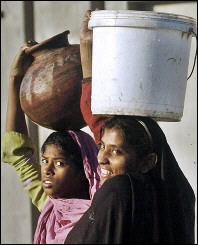 Pakistani women carry water containers back home
in a slum area of Lahore, March 2006. Women in poor countries are
often better at managing water resources and should therefore play a
bigger role in policy-making to ensure access to safe drinking water
and sanitation services, the World Water Week conference in
Stockholm heard. (AFP/File) |
Women in poor countries are often better at managing water resources and should therefore play a bigger role in policy-making to ensure access to safe drinking water and sanitation services, the World Water Week conference in Stockholm heard.
Women need to be more involved in water policy-making "because they're the ones who care. They're the ones who are responsible for fetching the water," Marcia Brewster of the UN Department of Economic and Social Affairs told AFP on the sidelines of a seminar on the role of gender in water management.
A study by the International Water and Sanitation Centre of community water and sanitation projects, covering 88 communities in 15 countries, found that projects designed and run with the full participation of women were more sustainable and effective than those that are not.
Because women are often in charge of fetching water, they have considerable knowledge about water resources, including location, quality and storage methods.
As a result, "they tend to have more practical solutions," said Meena Bilgi, a consultant on gender development in India.
"Also, it's easier for women (than men) to go talk to the village women about their needs. They can then bring those experiences back (to the policy-making level). But women are just not represented in policy-making," she said.
According to the United Nations, at the end of 2004 some 1.1 billion people, or 18 percent of the world's population, lacked access to safe drinking water, while 2.6 billion, or 40 percent of the population, lacked access to improved sanitation services.
In late 2005, there were 40 women ministers of water or environment representing every region of the world, UN figures showed.
While delegates hailed the progress being made in the field, many said it was going too slowly.
"It's not happening to the extent we would like to see," Sara Ahmed of the Gender and Water Alliance told delegates.
"World governments have to work more seriously at this. Gender work is chronically underfunded," Ethne Davey of South Africa's Department of Water Affairs and Forestry added.
Delegates said that to improve the situation, women's organisations must pressure their governments to change water management structures, men must be increasingly sensitized to gender issues and governments must be held increasingly accountable for progress.
Corruption in water management was another hot issue at the conference, with delegates complaining it had not received appropriate attention and that once again it was the poor who suffered the consequences.
"We know that corruption in the water sector is a huge problem... Up to now it's been completely unaddressed and there has been very little work done on it," said Haakan Tropp, project director of the Stockholm International Water Institute.
"For sure, those hardest hit are again poor people who are largely lacking political clout."
The seminar saw the launch of an international body tasked with monitoring corruption in the water sector worldwide, called the Water Integrity Network.
"The network will function as a mechanism to share experience, share information," Tropp said.
"Getting involved in anti-corruption issues can be very violent ... so this network can provide support, back up."
